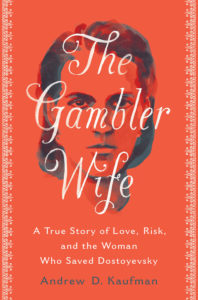How Did Anna Dostoyevsky Become A Brave Russian Publishing Pioneer?
Fyodor Dostoyevsky is one of the giants of world literature, a writer whose work is still widely read, enjoyed, and debated, more than 140 years after his death. But even he admitted that he wasn’t much of a businessman—and he lived much of his adult life as if trying to prove the point. Thankfully, he had a spouse who was able to overcome both his questionable decisions and the sexism of the day to establish herself as a publishing pioneer.
In my latest book, The Gambler Wife: A True Story of Love, Risk, and the Woman Who Saved Dostoyevsky, I tell the story of Anna Dostoyevskaya, the author’s second wife who played an underappreciated role in Dostoyevsky’s life — both personally and financially. The book highlights the many ways in which Anna helped Dostoyevsky reach his greatest heights despite the staggering hardships (many self-inflicted) throughout their lives.
Today, I want to highlight a decision that Anna made that would ultimately solve many of their money woes. By betting on herself—and having faith in her husband’s writing—she established herself as a force in the publishing world and helped change the way that future authors would be compensated for their work.
Taking Control of His Work
Upon finishing The Possessed in 1872, Dostoyevsky found himself once again in a dilemma. He was barely living off the payments received as the book was published serially in the literary magazine, The Russian Messenger. Once it was complete, he lost his sole source of income. The book, while admired today, caused a public firestorm at the time, and gained Dostoyevsky a host of new enemies in the literary world.
The tale of political murder laced with sexual depravity, social dysfunction, and spiritual sickness shocked and titillated its Russian readers. It also infuriated the radical intelligentsia, who saw in Dostoyevsky’s scathingly satirical portrait of the Russian revolutionary movement a direct attack on them.
As a result, publishers showed little interest in releasing the book in its full form. By 1873, the best offer they received was for a mere 500 rubles, to be paid in installments over two years. The proposal was too paltry to consider, but it gave them an idea: Years earlier, during their European travels, the couple had tossed around the idea of starting their own press and publishing Dostoyevsky’s works themselves.
For a couple in their financial circumstances, the prospect could hardly have seemed more farfetched. Dostoyevsky himself was incapable of running such a business, so the management would fall to Anna, who was both inexperienced in business and burdened by other family responsibilities. And for a twenty-six-year-old woman to wade into such dangerous waters struck Dostoyevsky’s family and friends as downright foolhardy. Certain that such a risky undertaking would only sink the family deeper into debt, they tried to talk the couple out of it.
Up to that point, the Russian book business consisted of printing shops that typically bought the rights to an author’s work and then printed and distributed the books throughout Russia, with nearly all the profit going to the publisher and very little to the author. Gender politics were not on the couple’s side, either: In the history of the notoriously cutthroat Russian book business, there had been only one translation and publication company successfully owned and run by women.
But Anna went about researching the publishing industry with her usual methodical thoroughness and nerve. With what she learned, Anna sketched out the beginnings of a plan. A limited-edition of 3,500 copies of The Possessed, printed in large, elegant type on satiny white paper, would cost roughly 4,000 rubles. At the usual sale price of three rubles fifty kopecks per copy, that would mean gross profits of 12,250 rubles. After deducting the roughly 30 percent bookseller discount for bulk orders, as well as other expenses, the Dostoyevskys stood to net well over 4.000 rubles—a handsome sum, especially when compared to the measly 500 rubles offered earlier.
Owning Their Own Publishing Company
Anna concluded that whatever the risks, owning their own publishing enterprise was too lucrative a prospect to pass up. She ordered paper from one of Petersburg’s best manufacturers, who gave it to her on credit. She then arranged for the printing and had the books bound. And so, on January 22, 1873, a day that Anna would proudly remember as the start of her career as a publisher, an advertisement appeared in the Petersburg newspaper The Voice announcing the independent publication, in a single volume, of Fyodor Dostoyevsky’s The Possessed.
By ten o’clock that morning, a messenger from the bookshop of M. V. Popov showed up at the Dostoyevskys’ publishing “headquarters” to place an order for ten copies. There were more rings at the door before the morning was out. Buyers came from all over Petersburg, and some from out of town as well, in each case negotiating fiercely with Anna, who gave as good as she got.
Once Dostoyevsky finally emerged from his bedroom in the early afternoon (he’d been up all night writing), he asked Anna, teasingly, “How’s our business going?”
“Marvelously,” she said.
“You’ve managed to, perhaps, to sell a book?” he continued with a wry smile.
“Not a book, but a hundred and fifteen,” she responded, abandoning her jocular tone and sitting up straight in the chair.
“You don’t say!” he said, assuming that Anna was just having a good joke with him. “Congratulations, then.”
“But I’m telling you the truth,” she responded, vexed. “Why don’t you believe me?” She removed from her pocket a piece of a paper with her notes about sales numbers, along with a wad of three hundred rubles in banknotes.
Dostoyevsky stared at the money, dumbfounded. This was no joke, after all. His Anyechka had indeed been selling his books.
Russia’s Sole Woman of Publishing
Before the end of the year, they had cleared 3,000 copies of The Possessed. Over the next couple of years, they would sell out the remaining five hundred copies, netting the couple, just as Anna had calculated, a profit of 4,000 rubles—around $54,000 today—which was enough to pay off some of their most urgent debts.
Thus began Anna’s career as Russia’s first sole woman publisher, a career that would in time wrest Dostoyevsky out of debt and continue to provide for their family for almost the next four decades. Beyond these benefits, the business model she created, which was unique in Russia at the time, had liberated her husband, a working creative who had been forced for decades to depend on an exploitative system for his livelihood.
Now he was able to earn far more than he ever had from his novels, through a business that the Dostoyevskys—or to be specific, Anna—ran.
***
Connect with Dr. Kaufman on Amazon, Twitter, Facebook, his private FB Group, Linked In, Instagram, Goodreads, and YouTube, and sign up for his newsletter here.
Follow Books Behind Bars on Twitter and Facebook.
Order The Gambler Wife: A True Story of Love, Risk, and the Woman Who Saved Dostoyevsky
Mailing List
To receive monthly articles, inspiration, and updates, including updates about Andy's new book, The Gambler Wife: A True Story of Love, Risk, and the Woman Who Saved Dostoyevsky, please fill out the form below.

